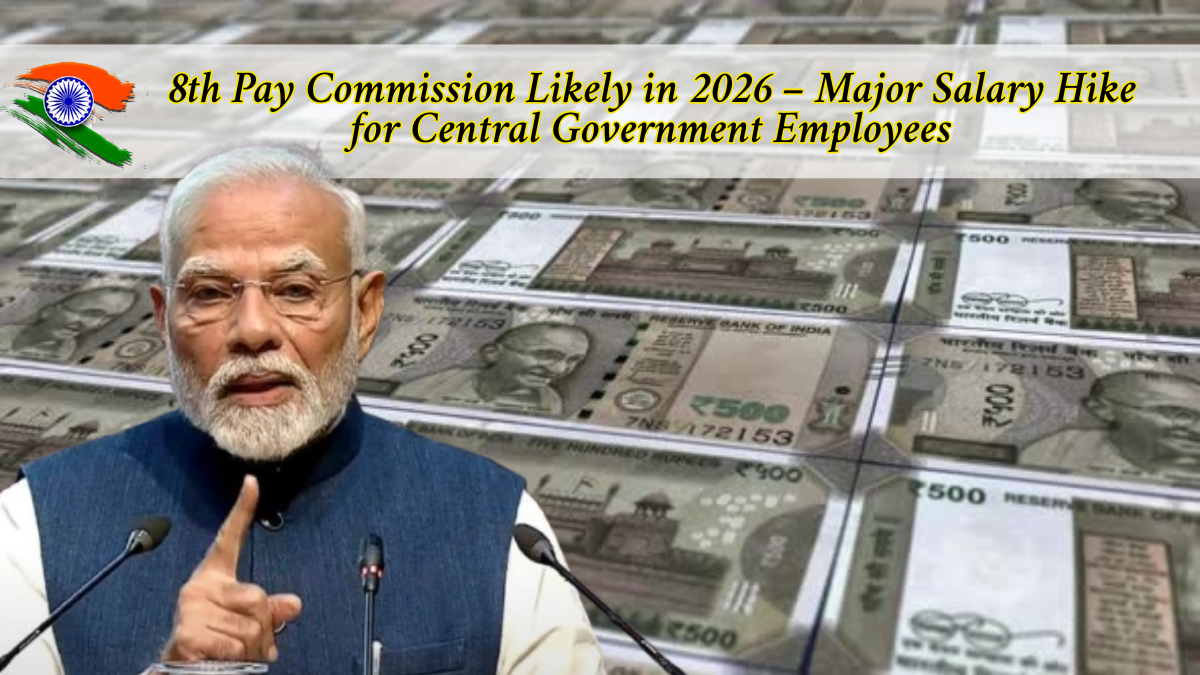The long wait for lakhs of central government employees might soon be over as expectations around the 8th Pay Commission (8CPC) continue to build. With the Seventh Pay Commission’s structure concluding by the end of 2025, all eyes are on the next big salary revision expected under the new commission. This article outlines the expected timeline, proposed salary structure, changes in allowances, pension benefits, and more.

Summary Table of 8th Pay Commission Highlights
| Feature | Details |
|---|---|
| Expected Implementation | January 1, 2026 |
| Announcement Year | Likely to be announced or discussed in 2025 |
| Fitment Factor (Expected) | Between 1.90 to 2.86 (most expected: 1.90) |
| Minimum Basic Salary (Expected) | ₹34,200 (up from ₹18,000 under 7th CPC) |
| Minimum Pension (Expected) | ₹15,000 – ₹20,000 (up from ₹9,000) |
| Maximum Pension Cap | ₹1.25 lakh |
| Effect on Allowances | Increase in DA, TA, HRA, PF, and gratuity benefits |
| Likely Beneficiaries | Employees from Level-1 to Level-6 especially |
| Official Site | https://www.finmin.nic.in |
When Will the 8th Pay Commission Be Implemented?
According to multiple government sources and policy experts, the Eighth Pay Commission is expected to be implemented from January 1, 2026. The groundwork for the new commission might begin as early as 2025. This would give the government adequate time to study and approve new recommendations before the existing pay structure under the 7th CPC expires in December 2025.
Preparations have already begun. Reports indicate that recruitment for 42 critical posts including the Chairman of the commission is underway, suggesting that formal work on the 8th Pay Commission may commence shortly. This is welcome news for central government employees who have been eagerly awaiting a revision in pay structure.
Expected Fitment Factor Under 8th Pay Commission
What is the Fitment Factor?
The fitment factor is a key multiplier used to calculate the revised basic salary of government employees. It directly influences the salary hike and acts as the basis for calculating various allowances and benefits.
Current Fitment Factor
Under the 7th Pay Commission, the fitment factor was 2.57, which increased the minimum basic pay from ₹7,000 to ₹18,000.
Expected Fitment Factor in 8CPC
For the 8th Pay Commission, the fitment factor is expected to range from 1.90 to 2.86, with 1.90 being the most discussed and likely figure. Here’s what that means in real terms:
- Current Minimum Pay: ₹18,000
- Expected Pay (at 1.90 factor): ₹34,200
This change alone will result in an almost 90% increase in the basic salary, which will also reflect proportionally in other allowances and retirement benefits.
Expected Salary Hike for Central Government Employees
The anticipated salary hike ranges between 18% and 24%, depending on the final fitment factor approved. Compared to the 14.27% hike offered under the 7th Pay Commission, this will mark a significant jump, particularly beneficial to employees in Level-1 to Level-6 pay bands, who form a substantial portion of the central government workforce.
Here’s a potential salary example for clarity:
| Pay Band | Current Basic Pay (7CPC) | Expected Basic Pay (8CPC) | % Increase |
|---|---|---|---|
| Level 1 | ₹18,000 | ₹34,200 | ~90% |
| Level 6 | ₹35,400 | ₹67,260 (at 1.90 factor) | ~90% |
Impact on Allowances: DA, HRA, TA
Along with a revised basic salary, the 8th Pay Commission will significantly impact various allowances, which are generally calculated as a percentage of the basic pay:
- Dearness Allowance (DA):
- DA revisions happen twice a year.
- Higher basic pay means higher DA payouts.
- House Rent Allowance (HRA):
- Usually 8% to 24% of basic pay depending on city classification.
- HRA will increase in line with the new basic salary.
- Transport Allowance (TA):
- Fixed based on pay level and city type.
- A higher pay scale could mean a reassessment of TA brackets.
Pension Benefits and Retirement Contributions
The 8th Pay Commission is not only beneficial for current employees but also for retired government personnel. The revised structure will have the following effects:
Pension Revisions
- Minimum Pension: Expected to increase from ₹9,000 to ₹15,000–₹20,000.
- Maximum Pension Cap: Likely to remain around ₹1.25 lakh.
Gratuity and Provident Fund (PF)
- With increased basic pay, gratuity payouts will also increase since they are calculated based on the last drawn salary.
- PF contributions (employee and employer share) will also go up, ensuring better retirement security.
Why This Matters for Central Government Employees
- After 10 years of the 7th CPC, inflation and the cost of living have surged, putting pressure on household budgets.
- The proposed hike will offer relief and restore the real value of salaries and pensions.
- It will also boost employee morale, retention, and productivity across government departments.
Next Steps and Government Action
The central government is likely to:
- Announce the commission setup in 2025
- Recruit necessary officials for recommendation formulation
- Gather data and employee feedback
- Present the proposal in Budget 2026
- Implement the recommendations effective from January 1, 2026
This phased approach is expected to ensure minimal disruption and smooth transition from the 7th to the 8th Pay Commission framework.
FAQs About the 8th Pay Commission
Q1: When will the 8th Pay Commission be implemented?
Answer: It is expected to be implemented from January 1, 2026, following government approval.
Q2: How much salary increase is expected?
Answer: The expected increase ranges between 18% to 24%, depending on the final fitment factor.
Q3: What is the likely fitment factor under the 8th CPC?
Answer: While still under discussion, 1.90 is the most expected value.
Q4: Will there be changes in allowances too?
Answer: Yes, all key allowances like DA, HRA, TA, etc., will be revised upward.
Q5: Who will benefit most from the 8th CPC?
Answer: Employees in Level-1 to Level-6 pay bands will likely see the highest relative benefit.
Q6: What changes are expected in pensions?
Answer: The minimum pension is likely to increase from ₹9,000 to ₹15,000–₹20,000, with a maximum cap around ₹1.25 lakh.
Q7: Where can I find official updates?
Answer: Updates will be posted on the Ministry of Finance official site: https://www.finmin.nic.in
For More Information Click Here
